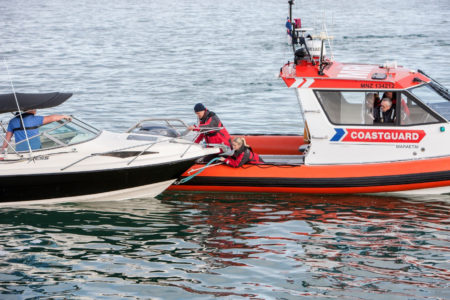
Coastguard volunteers have had one of their busiest summer periods in recent years with more people requiring Coastguard’s help around New Zealand’s coastline, lakes and waterways.
Easter weekend marks the official end of the summer boating season which so far has seen 121 people rescued since October, 30 more than the same time last year.
In January alone there were over 1100 calls for assistance made to Coastguard.
“The hot summer has definitely resulted in more people being out on the water,” says Coastguard CEO Patrick Holmes.
“Thankfully the majority of incidents, especially around the peak Christmas holiday period, were for mechanical issues. Generally people seemed to be following the boating safety code and making safe decisions out there.”
Alongside the vessel tows and mechanical issues, volunteers around the country also dealt with some testing incidents which had the potential for tragedy.
These included rescuing stranded motorists and residents in rapidly flooding rivers in Canterbury, rescuing a critically ill passenger from a cruise liner in heavy seas off Auckland, and most recently, managing the communication and coordinated rescue of two yachties in Northland over a sustained 35 hour period.
“Our volunteers are trained to the highest standards and are subsequently ready to leap into action 24 hours a day, 365 days a year,” says Holmes. “At the end of the day though, they are volunteers with jobs and families – their huge contribution to ensuring the safety of our boating communities this summer should not go unnoticed.”
While Easter is usually known for having rough weather, the forecast for the upcoming weekend is generally looking favourable for boaties with mostly light winds and warm days.
Coastguard warns that good weather shouldn’t lead to complacency.
“New Zealand’s weather is highly unpredictable and can change in an instant.”
“It’s essential for everyone to take proper safety precautions before heading out on the water this weekend, including checking the weather forecast and not going out on the water if it doesn’t look good,” says Holmes.
As well as checking the forecast, Coastguard recommends that everyone on board a boat less than 6 metres should wear a lifejacket while underway.
“Recent research from Maritime New Zealand has shown that more people are wearing their lifejackets all or most of the time on the water which is encouraging. Most boating accidents occur suddenly and there may not be time to grab a lifejacket – take them and wear them.”
Becoming a Coastguard member is another way to keep safe on the water, whether you break down or get a flat battery, you’ve got peace of mind every time you hit the water knowing Coastguard has got your back. Go to www.coastguard.nz/membership/ to find out more.









